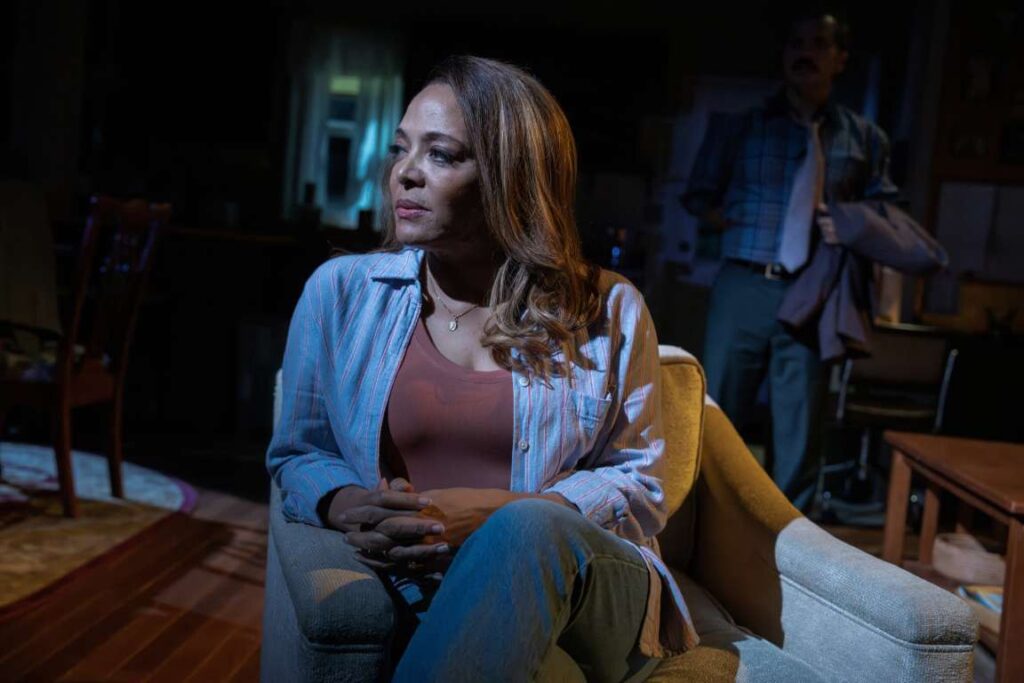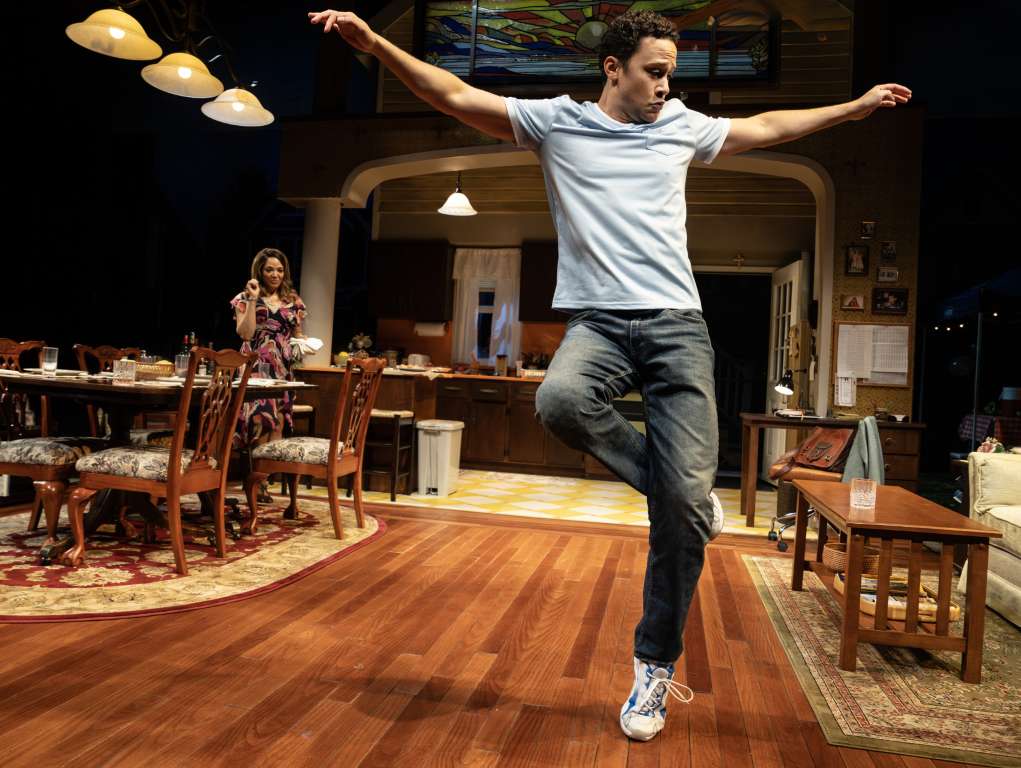By Stuart Miller…
John Leguizamo’s family drama tackles too many issues with too much exposition
“The Other Americans” opens on a picture perfect set that captures the outer borough aspirational first home. Then John Leguizamo comes on as Nelson, mid-phone call, cajoling and wheedling and cursing in a mix of English and Spanish with a blend of desperation and arrogance. Moments later, Nelson, a little bit buzzed from solo drinking, turns on the charm, dancing salsa and the hustle, both alone and with his wife, Patti (Luna Lorna Velez).
So far so good. But soon the play, which Leguizamo also wrote, falters, losing its early momentum in a bog of exposition. Leguizamo writes in the Playbill that he was aiming to create a “complicated” play about race and the issues Latinos face in America and especially in New York. That’s something he did well in his early solo shows, “Mambo Mouth,” “Spic-o-Rama” and “Freak,” where the characters all felt alive and their conflicts and desires had an urgency and immediacy.



But while a past racist incident is a catalyst for the play’s tragedy, Leguizamo throws too much in. There are strong moments along the way but there are also too many arguments and obstacles that feel contrived as plot points, there’s an extraneous character, and there’s just too much overall as the play drags past the two-and-a-quarter hour mark.
Nelson is in a self-made financial crisis regarding the laundromats he inherited from his father. He may have an offer on the table from a real estate developer but he’s initially loudly and proudly reluctant to sell despite Patti’s pleas. If only his half-sister Norma (Rosa Evangelina Arredondo) would front him some money he could turn everything around.


But Norma, who has flourished with the laundromats she got, knows Nelson’s schemes are doomed to fail. Plus she is planning an expansion to Southern California. Regional growth would ring more true but since Norma is looking to poach Nelson and Patti’s daughter Toni (Rebecca Jiminez) who works for her father (but is underappreciated) and her fiance Eddie (Bradley James Tejada) and there’s more conflict if they’d be heading 3,000 miles away.
There’s some good ideas in there, with Nelson as a modern-ish Latino Willy Loman (the play is set in 1998). That “Death of a Salesman” parallel is heightened by his troubled relationship with his son, Nick (Trey Santiago-Hudson, son of the director, Ruben Santiago-Hudson). Nick fell apart in his freshman year of college, turning to substance abuse and eventually landing in a psychiatric hospital.
As the play begins, he’s finally coming home and both his parents are nervous, eager and filled with unrealistic expectations. Despite their professions of love, neither wants to hear him, whether he’s talking about the need to move out, his desire to become a choreographer or his need to recount the high school incident that traumatized him indelibly. He had been dating a white girl and her ex-boyfriend and a bunch of other white kids attacked and badly beat Nick (in one of the family laundromats) and got away with it. Santiago-Hudson is effective at conveying how brittle Nick still is, unable to cope with his family’s blinders. The fact that he’s tall and strong only heightens how deep the hurt runs.


When you read all that, you might think it, Leguizamo has created a Latino version of an Arthur Miller or Tennessee Williams family drama. That’s what he’s going for, but there’s no forward momentum for much of the time.
And there is too much that just doesn’t belong, starting with the character of Veronica (Sarah Nina Hayon), Patti’s best friend, who is 49 and pregnant and who lives back in Jackson Heights, where life was good in the crowded apartments that Patti and Nelson started out in. Absolutely nothing would be lost by removing her character.


Then there are scenes like the one where Nelson confesses to Patti about how his father once locked him in a trunk in a basement. It’s hard to imagine he never mentioned this before and the context in which it comes up feels forced. It also doesn’t reveal anything genuine about Nelson’s character or how he does or doesn’t handle conflicts. But there’s a lot that feels that way– it’s unclear why Patti refuses to let Nick live on his own, or why her resistance is such a point of contention since he’s old enough to get a job and earn enough to pay for an apartment. (He does go off on a job interview and is planning that move.)
The play is building toward a conclusion that you’ll see coming but the contrivances that cause a final familial blow up seem shoehorned in and rob the play of much of its power. Perhaps with more rewriting Leguizamo can find the voice that was so natural and alive in his solo shows and sharpen the story that’s getting lost in the excess here.
The Other Americans runs 2 hours and 15 minutes at The Public Theatre. It runs through October 26th.
Production Photos by Joan Marcus


